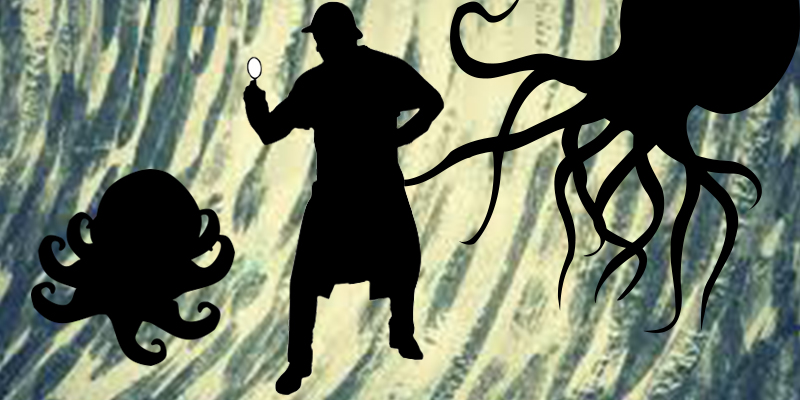Ever since 1892, one thing is certain: if you like crime fiction, you are not getting away from Sherlock Holmes. There are the original books, there are plays stretching all the way back to the 1900s, there are American TV shows, British TV shows, several Batman episodes where he and Robin feel distinctly Holmes and Watson-esque. Heck, even Ironman is hanging up his repulsors to go back and be Holmes again. The secondary Holmes canon is thriving.
And it’s also changing. Savvy readers have begun to note how often the world’s favorite detective is now being given a supernatural, even Lovecraftian spin. But why? To seek an answer, some of those savvy readers have turned to me—one of the authors most to blame for the current phenomena—to ask what the heck is going on. I have identified 3 main reasons, in ascending order of geek-snootiness.

Reason 1: Everybody thought he was magic, anyway.
Seriously, read the original stories and try and count the number of times people accuse Holmes of being magical or otherworldly. It happens over and over. Sure, Doyle always has Holmes explain his insights and it is always observation, logic and deduction that carry the day. Still, even the original canon is rife with the idea that Holmes may be magical.
And let’s not forget the proliferation of fantastic elements around him. The second novel has a suspected hell-hound in it. There’s one called The Sussex Vampire. And yes, those two are dismissed as fakes, but what about The Adventure of the Creeping Man? What about The Sign of Four? The villains in those stories are a man who’s been taking a serum to make himself half ape and a poison-shooting murder-midget!
Really, it’s so damned easy to switch him over, I can’t believe more people aren’t doing it. Know how I started? I was in a group with a woman who was doing a fantasy and whose protagonist was perfect. I encouraged her to give him some flaws, like Sherlock Holmes. Sure, Sherlock can out-think any other human, but if Watson’s not there to tell him to put his pants on, he probably won’t. She said that was a stupid idea—how would you ever make Holmes work in Fantasy? On the drive home, I realized how close he was to fantasy already. I then thought of the pun Warlock Holmes and gleefully ran upstairs to Google it, sure I was about to find a wealth of material that would have me laughing for hours.
There was nothing.
So, I wrote it myself. Which leads me to my next major point…

Reason 2: Because we can.
See, here’s the thing, the original Sherlock Stories are almost all in the public domain now. Only a handful of the last stories—not the ones that are considered Doyle’s best work, by the way—are still protected. Aside from those few exceptions, these stories are so old and so embedded into our cultural fabric that they are considered to belong to all of us. Congratulations, everybody. You’ve waited it out. You own Sherlock Holmes, now. You can do whatever you want with him. Make him yours.
In fact, if you are producing works that require a lot of money to accomplish—for example TV and movies—you almost have to make him your own, first. One of the weird ironies of my books is this: if anybody wants to scratch together a budget and do Sherlock Holmes, they certainly can. If anybody wants to do Warlock Holmes, they have to talk to me. (And please do, by the way. I’d like to buy a house.) But if you do make a Sherlock movie, there’s more of a license for other people to copy your tone and build on your achievements. Now that the original is public domain, you sort of have to have the rights to a distinct adaptation in order to be protected from the very thing that gave you the rights to the character in the first place.
And let’s be real, those adaptations are going to keep on coming. In a world where the most successful video games are sequels, where the most successful movies are retellings of our grandfathers’ comic books, is it any wonder that a character as old, as loved, as well-established and as grand as Holmes is getting all these re-boots? Come on, don’t be naïve! This was practically inevitable.
Also—and not for nothing—know who else’s works are rolling into public domain right about now? H.P. Lovecraft. And where Arthur Conan Doyle has a reputation as a bit of a racist, sexist, white-supremacist and xenophobe, much of this can be explained by his place and time. H.P. Lovecraft was more… hmmm… well, let’s just say he tended to wear his heart on his sleeve, eh? The dude was not subtle, is what I’m saying. To bring any of his works to mainstream attention now, you really need to be able to update them or you’re going to alienate a huge chunk of the fan base. And not just the people who fall into one of the categories he lambasts, by the way. I don’t care if you are a straight, white, male, mainstream-as-you-get person, if you’ve got any sense of decency, you’ll come across a number of passages in original Lovecraft that make you squirm in your seat. Still, the underlying ideas of his works are so… well… cool, that they are becoming cornerstones of fantasy. The darkness, the horror, the helplessness, the hopelessness all take a genre that could be considered “for kids” and raise the age-appropriateness scale to the point where even faint-hearted adults and optimists need not apply. This dude just owns the idea of dark fantastic. I swear, if not for H.P. Lovecraft, there would be no such thing as death metal. His influence is that wide-reaching. It’s getting harder and harder to find geek-popular material that doesn’t have a Lovecraftian element. Which leads me to the final point…

Reason 3: Geeks are winning the culture war and magic belongs to us.
Yeah. Here’s the real reason Holmes is getting supernatural. Suck it, jocks; the world is ours now!
I’m an old man, I guess, and I remember a time when being geeky meant you were a pariah. Mainstream culture had no idea what D&D was, unless they thought it was a Satan thing. Comic books were kids’ stuff. Swords and sorcery got a movie every now and then, but they were cheap, bad, and largely ignored. Of course, we die-hard fantasy fans loved them. We had to. They were all we had. All you Millennials, I want you to sit down and watch Revenge of the Nerds and Weird Science (and I know it’s going to make you cringe, but it’s good for you, I promise). See how marginalized we were? See how far geeky was from cool? The closest thing we had to a cultural bridge was Star Wars. Most people had seen it. And the liked it, sure, but they didn’t love it. And it wasn’t like, fantasy, right? This was sci-fi and that was different. Plus: cool explosions. You could like Star Wars and still be normal. (And by the way, to all the bullies at my middle school: the story where the “crazy old wizard” brings a glowing sword to a farm boy and teaches him to use magic to save a princess from a wicked black knight may—and I’m just saying, may—owe a bit to the fantasy genre.)
So magic belonged to D&D and Lord of the Rings and eventually MtG and all the geeks who were into that sort of thing. But here’s the thing: we loved it because we knew it was cool. And we were right. So bit by bit, Harry Potter by Harry Potter, LotR films by LotR films, the mainstream began to realize we’d had the awesome stuff, all along. The trickle became a roar! X-men! Avengers! Game of Thrones! And now, finding somebody who doesn’t like at least one of those things is almost impossible. The marginalized culture has overtaken the mainstream. We’re all geeks now, like it or not, and America’s expanding geek culture is sending its dark little tendrils out, seeking—always seeking—for the next thing it can devour. Our dominance is changing things. I live in Vegas. We’ve got one sports team. They’re called the Golden Knights and, believe me, if the big castle that takes up one side of their arena and the fantasy-shows they put on before the games seem a little geek-friendly, that is no accident. Or maybe I’m wrong. Maybe you can find me a sports movie that out-earned Avengers.
So how did all of this work its way over to Holmes? Easy. Sherlock is a super hero and his only power is that he’s smart. Geeks value smart—we always have. Just like we value magic. So, if Sherlock has been natural geek-bait all along, can we really be surprised that he’s becoming magic, too? (And yes, to the people who have read my books: I do realize my version of Holmes is *ahem* not always at the cutting edge of braininess. But come on! My Watson is! So, cut me some slack, eh? I’m geek like you.)
Detractors of this geek-expansion say this is a phase and will fade like any other. Maybe they are right. Maybe magic, as a literary device, will prove a little too convenient to stand the test of time. Maybe superhero stories will get so repetitive as to be completely played out. Maybe the era of grim-dark will give way to a new age of optimism. Maybe. Until then, don’t be surprised if Holmes crosses swords with a Lovecraftian horror every now and then. And—as in my books—if it’s a curved, black soul-sword, burning with demonic flames, don’t be surprised by that either.

















